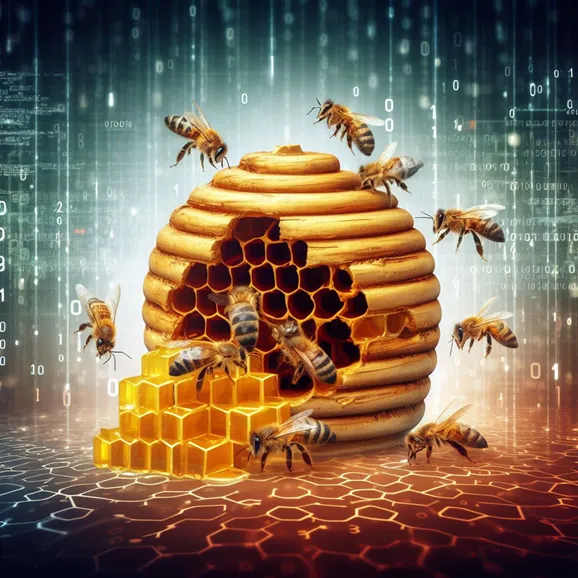Context Engineering and Domain Expertise in Generative AI-Powered Software Development
October 24, 2023
Art Morales, Ph.D.

As artificial intelligence (AI) continues its steady march into various facets of our daily lives, its capacity to generate content, solutions, and even software is no longer the stuff of science fiction. Generative AI, particularly modern foundational models like GPT-4, have shown incredible promise in augmenting human capabilities in software engineering. However, the narrative that these advanced AI models can replace human ingenuity and expertise entirely is flawed (at least for the time being).
Just as a worker bee cannot function effectively without the guidance of a queen bee, generative AI, which can be thought of as the worker bee, is insufficient without the context provided by human domain experts.
Generative AI: The Worker Bee
Generative AI models are often lauded for their ability to produce coherent and functional output based on the data they’ve been trained on. From drafting emails to generating code snippets, these models act as auxiliary tools that can perform tasks efficiently. However, they lack an understanding of the broader context in which these tasks are embedded, making their role more analogous to a worker bee than a pilot.
Domain Expertise: The Queen Bee
Human domain experts serve as the “queen bees,” providing the critical insight and experience necessary for any project’s success. These experts can dissect complex problems into simpler, more manageable tasks that the generative AI can then handle. Their specialized knowledge ensures that the tasks generated align with the specific requirements and constraints of the project. They can also anticipate many of the risks associated with the domain and project details.
Context Engineering: The Hive Architecture
Context engineering serves as the ‘hive’ in which the worker bee (Generative AI) and queen bee (Domain Expert) operate. It is the systematic process by which humans lay down the foundational rules, requirements, and context so that generative AI can produce meaningful and relevant output. Context engineering involves tasks like analyzing and mitigating risks, pre-processing data, defining problem statements, and setting project goals.
The Role of the Copilot
Code and chat copilots are great tools. But they are referred to as copilots for a reason. Consider the relationship between a pilot and a copilot in an airplane. The copilot assists, manages sub-tasks, and follows the pilot’s directions but does not take over the primary role of flying the plane. Similarly, generative AI can be seen as a copilot in software engineering. It can draft code, suggest algorithms, or even optimize existing systems, but the overarching architectural decisions and fine-tuning are tasks that require the nuanced understanding and decision-making abilities of a human expert.
The Bioinformatics Paradigm: A Relevant Example
To truly grasp the limitations of Generative AI operating without contextual input, let’s consider a real-world example from the field of bioinformatics. Biology is inherently “fuzzy,” and experimental results can often appear unpredictable. This unpredictability stems from multiple factors:
· Human Factors: Issues like poor experimental design or flawed execution can lead to inconsistent results.
· Complex Systems: Sometimes the biological system under study is far more complicated than current scientific understanding, making it challenging to control all variables effectively.
· Inherent Variability: Even with perfect experimental design and execution, there exists a level of natural variability that could lead to different outcomes.
In the biological sciences, it’s often said that science is 99% failure and 1% success. This high rate of failure is not an indictment but an education, teaching biologists hard lessons about the complexity of life. These lessons are invaluable when biologists transition into more digital roles such as informaticians or data scientists. Their experience in the lab gives them a level of understanding and problem-solving ability that a data scientist with only theoretical knowledge of biology could lack.
Just as a seasoned biologist-turned-data scientist can bring invaluable insights into a bioinformatics project, a human expert’s domain knowledge and experience are crucial in guiding generative AI to generate useful and accurate software solutions.
Human Roles in Software Development Aren’t Going Away Any Time Soon
In any case, Generative AI, no matter how advanced, is not yet capable of replacing the critical role played by human expertise in software development. While AI can certainly augment and accelerate many aspects of the development process, the need for domain expertise and robust context engineering remains pivotal. Just as a worker bee needs a queen bee and a hive, generative AI needs the guidance and contextual framework that only human experts can provide. Embracing this symbiotic relationship is key to leveraging the full potential of generative AI in software engineering.
Finally, one of the most exciting promises of Generative AI-driven software development, is not the acceleration of the development when put in the hands of seasoned developers, but in the fact that it can lower down the barriers for domain experts to create tools with the right context and therefore quicker and larger impact on innovation.
By acknowledging the limitations and harnessing the strengths of both human experts and AI, we can forge a future where technology and human ingenuity exist not in competition, but in collaboration. Of course, it remains to be seen if and when a proper artificial general intelligence (AGI) emerges and creates a singularity event that displaces even more roles. However, technical prowess will always have a bigger impact when context and domain knowledge collaborate with it. At XponentL, we’re constantly evaluating and implementing new technologies and approaches to solve current and future data problems in context. Get in touch and we can talk about your data challenges and hopes. We can help!
